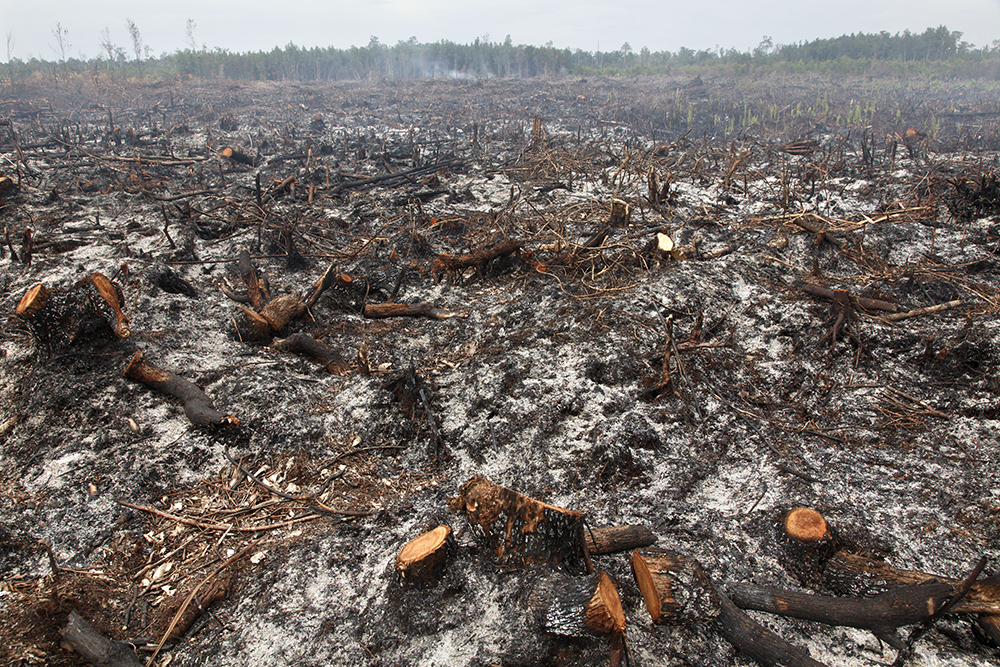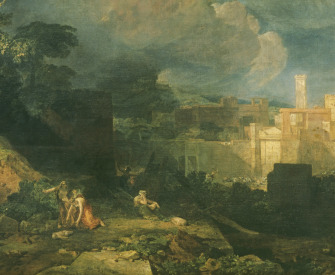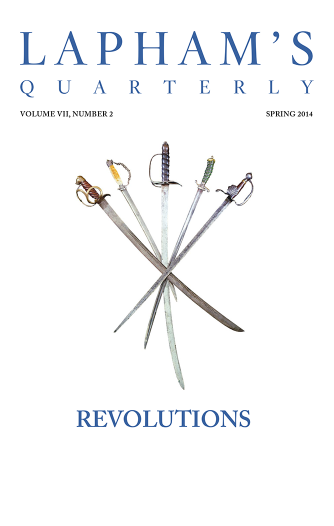It raineth every day, and the weather represents our tearful despair on a large scale.
—Mary Boykin Chesnut, 1865Particulate Matters
Charles Dickens wades through fog.
It was a foggy day in London, and the fog was heavy and dark. Animate London, with smarting eyes and irritated lungs, was blinking, wheezing, and choking; inanimate London was a sooty specter, divided in purpose between being visible and invisible, and so being wholly neither.
Gaslights flared in the shops with a haggard and unblessed air, as knowing themselves to be night creatures that had no business abroad under the sun; while the sun itself, when it was for a few moments dimly indicated through circling eddies of fog, showed as if it had gone out and were collapsing flat and cold. Even in the surrounding country, it was a foggy day, but there the fog was gray, whereas in London it was, at about the boundary line, dark yellow, and a little within it brown, and then browner, and then browner, until at the heart of the City—which call Saint Mary Axe—it was rusty black. From any point of the high ridge of land northward, it might have been discerned that the loftiest buildings made an occasional struggle to get their heads above the foggy sea, and especially that the great dome of Saint Paul’s seemed to die hard; but this was not perceivable in the streets at their feet, where the whole metropolis was a heap of vapor charged with muffled sound of wheels, and enfolding a gigantic catarrh.
At nine o’clock on such a morning, the place of business of Pubsey and Co. was not the liveliest object even in Saint Mary Axe—which is not a very lively spot—with a sobbing gaslight in the countinghouse window, and a burglarious stream of fog creeping in to strangle it through the keyhole of the main door. But the light went out, and the main door opened, and Riah came forth with a bag under his arm.
Almost in the act of coming out at the door, Riah went into the fog and was lost to the eyes of Saint Mary Axe. But the eyes of this history can follow him westward, by Cornhill, Cheapside, Fleet Street, and the Strand, to Piccadilly and the Albany. Thither he went at his grave and measured pace, staff in hand, skirt at heel; and more than one head, turning to look back at his venerable figure already lost in the mist, supposed it to be some ordinary figure indistinctly seen, which fancy and the fog had worked into that passing likeness.
Arrived at the house in which his master’s chambers were on the second floor, Riah proceeded up the stairs and paused at Fascination Fledgeby’s door. Making free with neither bell nor knocker, he struck upon the door with the top of his staff and, having listened, sat down on the threshold. It was characteristic of his habitual submission that he sat down on the raw dark staircase, as many of his ancestors had probably sat down in dungeons, taking what befell him as it might befall.
After a time, when he had grown so cold as to be fain to blow upon his fingers, he arose and knocked with his staff again and listened again, and again sat down to wait. Thrice he repeated these actions before his listening ears were greeted by the voice of Fledgeby calling from his bed, “Hold your row! I’ll come and open the door directly!” But in lieu of coming directly, he fell into a sweet sleep for some quarter of an hour more, during which added interval Riah sat upon the stairs and waited with perfect patience.
At length the door stood open, and Mr. Fledgeby’s retreating drapery plunged into bed again. Following it at a respectful distance, Riah passed into the bedchamber, where a fire had been some time lit and was burning briskly.

Illegal deforestation, Indonesia, 2011. Photograph by Jean Gaumy. © Jean Gaumy / Magnum Photos.
“Why, what time of night do you mean to call it?” inquired Fledgeby, turning away beneath the clothes and presenting a comfortable rampart of shoulder to the chilled figure of the old man.
“Sir, it is full half past ten in the morning.”
“The deuce it is! Then it must be precious foggy?”
“Very foggy, sir.”
“And raw, then?”
“Chill and bitter,” said Riah, drawing out a handkerchief and wiping the moisture from his beard and long gray hair as he stood on the verge of the rug, with his eyes on the acceptable fire.
With a plunge of enjoyment, Fledgeby settled himself afresh.
“Any snow, or sleet, or slush, or anything of that sort?” he asked.
“No, sir, no. Not quite so bad as that. The streets are pretty clean.”
“You needn’t brag about it,” returned Fledgeby, disappointed in his desire to heighten the contrast between his bed and the streets. “But you’re always bragging about something.”

Charles Dickens
From Our Mutual Friend. In June 1865 Dickens was returning home from holiday in Boulogne with his mistress and her mother when their train derailed, killing ten passengers. “No imagination,” he later wrote to a friend, “can conceive of the ruin of carriages, or the extraordinary weights under which people were lying.” For three hours he tended to the injured, doling out brandy from his flask and fetching water in his hat, pausing only to return to his carriage to retrieve the manuscript of Our Mutual Friend’s sixteenth installment from the pocket of his overcoat.

